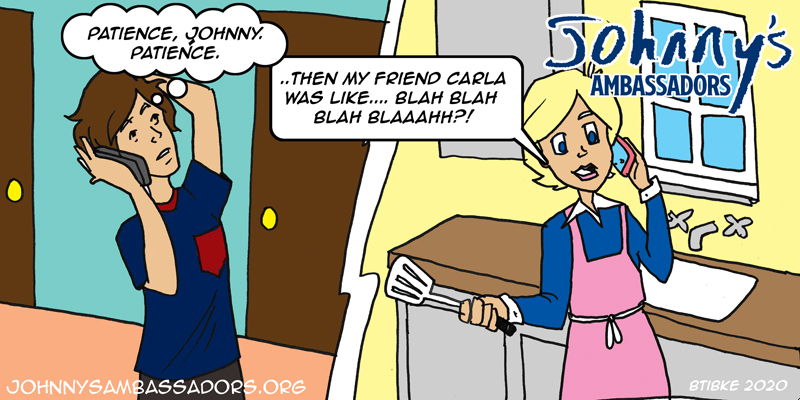By Laura Stack
Last week, I introduced a series of articles based on the five guiding values by which my son Johnny endeavored to live his life. I started off with altruism, as expressed in the ways we help other people with no expectation of reward. This week, we’ll focus on a value that seems rare in this age of immediate or near-immediate gratification: patience.
In Johnny’s words:
“I would say patience means being able to wait, even through stressful and infuriating situations, often in order to achieve a better result.”
Admittedly, it was initially difficult for me to understand how patience could be Johnny’s 2nd value because he could be very impatient at times. On one of our vacations in Hawaii, his favorite place in the world, we visited a place out in the ocean called Turtle Town, where a great many sea turtles lived. We were told, “Please don’t swim to the turtles. Just be patient and wait, and they may come up to you. If they come up to you, please don’t touch the turtles, just watch them.” Of course, what does Johnny do? Swim toward the turtles AND touch them.
I think Johnny listed patience as the second most important value because he WANTED to be more patient. He thought it was important and valued it. Johnny said:
“Patience is a very important virtue to practice, because if you expect immediate gratification from most things, often you will leave disappointed.”
I’m sure you’ve heard that old saying he mentioned, “Patience is a virtue,” which I used to repeat to them as children. But have you ever really thought about that saying? The Oxford English Dictionary defines virtue as “a behavior showing high moral standards.” The dictionary defines patience as “the capacity to tolerate trouble, delay, or suffering without getting angry or upset.”
Ideally, patience should be so common in day-to-day life that it goes almost unnoticed. But it isn’t. There are some situations where we expect or demand patience: from adults teaching or tending children, from store clerks and other providers in retail situations, and in any customer or human service position. Breakdowns happen, but typically there are consequences for those who lose their patience in such situations.
Otherwise, patience is distinctly lacking for many people, as you can observe every day. Many tend to get irritated, angry, or even infuriated when something keeps them from getting from Point A to Point B (literally or figuratively) in the least possible amount of time. We’ve also become so technologically sophisticated we don’t expect to have to wait on anything for very long. Some of you can still remember the days when you had to wait for your car to warm up before you could go somewhere. TVs took a minute or two to warm up enough for the image to appear. Computers couldn’t handle more than one program at a time, and it took several minutes for a large text file to open. Today, we don’t have to wait long for most of our technology.
However, when there’s a human interface, there will be wait time. I think that’s where we need to be better as a society. Johnny said:
“I practice patience every day by doing a myriad of things, such as when the person in front of me on the highway is going ten under, or when there’s a line at the grocery store, or when my mother has stretched out a phone call to 25 minutes.”
(This week’s cartoon illustrates that, haha!) Johnny, like every child since the first generation of humanity, has been in a hurry to grow up. Frustration is a simple fact of human existence. Our oldest texts often relay stories of impatience that got people in serious trouble. In the Book of Numbers in the Christian Bible, Moses struck a rock to get it to produce water instead of speaking to it, as God had instructed, because he felt frustrated and impatient with his people.
Too much built-up stress and anxiety caused by impatience can cross over from mind to body, resulting in health issues ranging from to panic attacks to cardiac arrest.
Patience helps you organize your thoughts and expectations, so you can manage your emotions, and persist in your actions long enough to achieve your goals. Patient people are also healthier than impatient people, whether you’re talking acne or pneumonia — or at least, they’re less likely to report health issues. More importantly, exercising patience is key to maintaining your mental health, if only because it’s unreasonable to expect instant gratification.
Giving yourself a time-out, counting to ten, taking a walk, or just quietly praying or meditating can take the edge off your anxiety. In Johnny’s words:
“While facing difficult or challenging situations, it’s always best to just take a few deep breaths and destress yourself so that you can proceed with the clearest mind to make the best decision. Other coping exercises such as taking a break from what’s causing you stress or doing something you love can help de-escalate your emotions in intense scenarios.”
As I’ve been forced to learn from Johnny’s suicide, God’s time isn’t always my time. I must be patient to fully understand, and I may never know this side of heaven. As Johnny pointed out, “Many good things take time to blossom to reach their full potential, and there is no use in getting frustrated.” Patience can give you peace of mind, and even make you feel good when you use it to help other people, as we’re working to do with Johnny’s Ambassadors. It certainly can be healing.
When you want something badly enough, be patient, keep working hard, and wait for it to happen. Johnny and I loved Billy Joel. For his 18th birthday, we decided that I would take him to NYC to see Billy Joel at Madison Square Garden. But then Billy had to have sinus surgery and rescheduled the tour. Then we had to cancel the 2nd attempt, but we finally got to see him when he came to Denver in August 2019. We were right up front and sang along loudly, together. He told me, “Third time’s a charm, right mom?” I told him his patience had won out.


